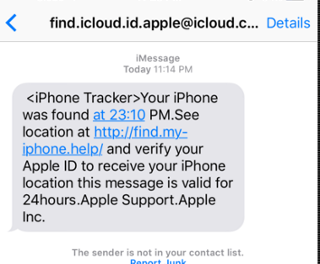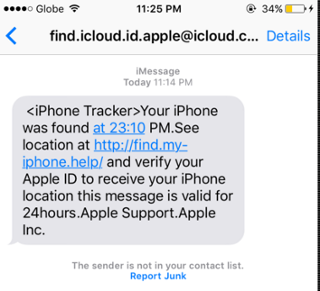Security Tip #4 – Beware of Stolen iPhone Scam
 iMessage from spoofed iCloud address
iMessage from spoofed iCloud address

iMessage from spoofed iCloud address
Don’t fall victim to this sophisticated lost iPhone scam!
According to Stu Sjouwerman’s article on KnowBe4’s Security Awareness Training Blog, here’s how the scam works:
- Your iPhone [is] stolen.
- You go online and turn on the Find My iPhone Activation Lock.
- Shortly afterward you get an iMessage that the phone is found, but you need to go to this website and verify your Apple ID. You quickly do this.
- Gotcha! It is a spoofed Apple iCloud site and when you enter your credentials, these go straight to the scammers who now own your account and unlock the phone.
- You’ve been social engineered and the thieves will sell the phone. Nothing to do, but go to Apple, change your password, and set up 2-factor verification for your account. Sadly, your iPhone (or iPad) is now gone forever.
Sjouwerman goes on to explain how easily the scammers are able to do this. “[They] send an iMessage to the email address that it said it had been locked by, as the default iOS settings mean you can send and receive iMessage to email addresses with an Apple ID.” The scammers then count on you being in such a panic to recover your phone that you follow the link without ever noticing the phony email address the iMessage was sent from or the fake Apple iCloud log in page linked in the iMessage.
Have more questions? Please contact the Information Technology Helpdesk at 540-375-2225 or helpdesk@roanoke.edu.





